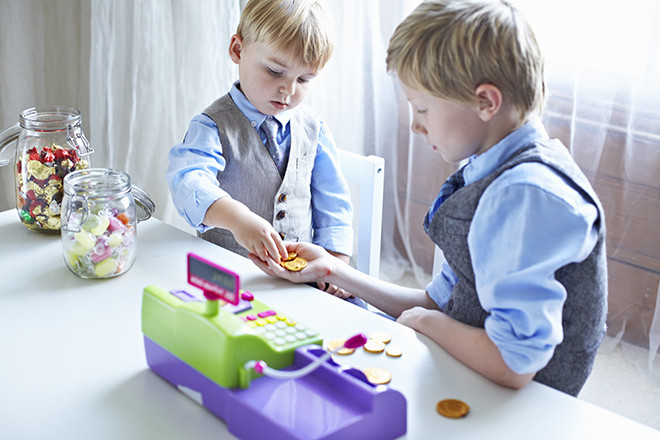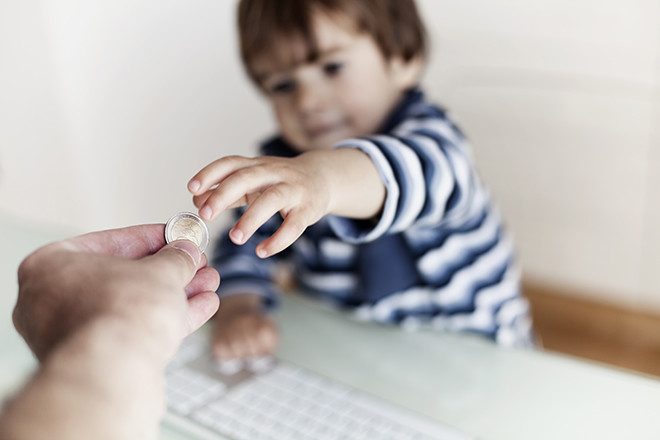When children are denied the purchase of toys, becausethat it is too expensive, they often answer: “And you take money from the card!” Seeing that adults take out bills from an ATM, simply inserting a card into it, the kids begin to think that getting money is simple enough. It is important to explain to the child that money must be earned. And besides this, pay a lot of attention and talk about how to spend them. Psychologists believe that the best education of financial solvency is the ability to manage pocket money from an early age. Photo: Getty Images Elena Nikolaeva, medical psychologist:
Photo: Getty Images Elena Nikolaeva, medical psychologist: It’s impossible to gain your own experience andlearn how to manage money (spend, save, plan) without real money, in the case of children it is pocket money. Even in kindergarten, our children enjoy playing “in the store,” using pieces of paper in the form of banknotes, leaves of trees, flower petals, and stones. Having matured, children with pleasure play business games like "Monopolies". Getting and managing their own pocket money is the most effective method of financial education of children. Only in his own experience with money management can a child learn how to spend, save and invest effectively. Even a small, but own personal budget gives the skills of saving money. Parents tips can influence this process.
It’s impossible to gain your own experience andlearn how to manage money (spend, save, plan) without real money, in the case of children it is pocket money. Even in kindergarten, our children enjoy playing “in the store,” using pieces of paper in the form of banknotes, leaves of trees, flower petals, and stones. Having matured, children with pleasure play business games like "Monopolies". Getting and managing their own pocket money is the most effective method of financial education of children. Only in his own experience with money management can a child learn how to spend, save and invest effectively. Even a small, but own personal budget gives the skills of saving money. Parents tips can influence this process.  Photo: Getty Images Do parents need to discuss with the child what their money will go for?
Photo: Getty Images Do parents need to discuss with the child what their money will go for? First you need to discuss with the child the essencepocket money - what it is for, what you can do, share your own experience. Ask your child about what significant acquisitions he dreams. It could be a bike, rollers, a phone, a new game, any other valuable thing for him. Count together how much time is needed to save up for this thing. Speak the need to abandon any current expenses in favor of accumulation. Make together with him several options for the savings plan, let him choose the one he likes more and stick to it. Be sure to return to this conversation a few weeks or months later and discuss successes or failures. The purpose of pocket money for a child is to give him the opportunity to learn in a real situation to make decisions about his own financial resources.
First you need to discuss with the child the essencepocket money - what it is for, what you can do, share your own experience. Ask your child about what significant acquisitions he dreams. It could be a bike, rollers, a phone, a new game, any other valuable thing for him. Count together how much time is needed to save up for this thing. Speak the need to abandon any current expenses in favor of accumulation. Make together with him several options for the savings plan, let him choose the one he likes more and stick to it. Be sure to return to this conversation a few weeks or months later and discuss successes or failures. The purpose of pocket money for a child is to give him the opportunity to learn in a real situation to make decisions about his own financial resources.  Pocket money instills planning skillsbudget, here and now the child can not get himself the right thing, and after a while he can, teach children to be patient, because sometimes you have to save money for a long time to get some expensive and necessary thing. Also, pocket money develops self-confidence, in its own strength, in those moments when the child himself decides what to buy, becomes “as an adult,” deciding for himself what to do and how. The child may be responsible for some expenses independently, depending on the age it may be school meals, payment for cellular communication, movement in the city, gifts to friends, going to the movies, articles of clothing, stationery.
Pocket money instills planning skillsbudget, here and now the child can not get himself the right thing, and after a while he can, teach children to be patient, because sometimes you have to save money for a long time to get some expensive and necessary thing. Also, pocket money develops self-confidence, in its own strength, in those moments when the child himself decides what to buy, becomes “as an adult,” deciding for himself what to do and how. The child may be responsible for some expenses independently, depending on the age it may be school meals, payment for cellular communication, movement in the city, gifts to friends, going to the movies, articles of clothing, stationery.  Photo: Getty Images Is it necessary to keep track of how the child spent his pocket money?
Photo: Getty Images Is it necessary to keep track of how the child spent his pocket money? It will be useful from time to time to disassemble wastea child, especially if he is unable to control them independently. Pay attention to the fact that children are our copy, therefore, in order to bring up a financially literate child, first of all, you should take care of your own financial literacy. Everything that you recommend or tell your child about financial literacy will be an example only if you yourself adhere to the same rules. Do not turn money into a method of manipulation. Money should not be seen as an incentive to behave, to get good grades or, even worse, for work done at home, but as a means of teaching a child financial skills.
It will be useful from time to time to disassemble wastea child, especially if he is unable to control them independently. Pay attention to the fact that children are our copy, therefore, in order to bring up a financially literate child, first of all, you should take care of your own financial literacy. Everything that you recommend or tell your child about financial literacy will be an example only if you yourself adhere to the same rules. Do not turn money into a method of manipulation. Money should not be seen as an incentive to behave, to get good grades or, even worse, for work done at home, but as a means of teaching a child financial skills. Photo: Getty Images Is it possible to “fine” a child for his misdeeds, not giving him more money or taking back the already issued ones? And is it worth paying a child for fives?
Photo: Getty Images Is it possible to “fine” a child for his misdeeds, not giving him more money or taking back the already issued ones? And is it worth paying a child for fives? Do not encourage or punish the child withpocket money. The amount of money issued should not depend on grades obtained at school, homework performed, good behavior. The student must understand: learning is his duty. The motive of the “five is a monetary reward” leads to the fact that the child becomes nervous, if he does not get “excellent”, worries because of failure, which in turn can lead to problems and stress, disruption sleep, loss of appetite, interrupted communication with peers. You need to encourage not evaluation, but effort. If, for example, the child made efforts and corrected the assessment, if he performed all the homework on a subject that was difficult for him. Interesting trips, excursions, going to a cinema, an entertainment center, spending time together with parents, meeting friends, that is, aimed at getting new impressions, can be a reward.
Do not encourage or punish the child withpocket money. The amount of money issued should not depend on grades obtained at school, homework performed, good behavior. The student must understand: learning is his duty. The motive of the “five is a monetary reward” leads to the fact that the child becomes nervous, if he does not get “excellent”, worries because of failure, which in turn can lead to problems and stress, disruption sleep, loss of appetite, interrupted communication with peers. You need to encourage not evaluation, but effort. If, for example, the child made efforts and corrected the assessment, if he performed all the homework on a subject that was difficult for him. Interesting trips, excursions, going to a cinema, an entertainment center, spending time together with parents, meeting friends, that is, aimed at getting new impressions, can be a reward.  If you want to see your child goodestimates and you know that he has the potential, then you can set a goal for the child, that if you receive such a level of assessment you give him some valuable gift. Money for a good mark does not teach him to really work, but only to teach visibility of labor. At the same time, the child begins to realize that parents expect good grades from him, while not having the motivation to learn. As a result, there is a high risk of developing buy-and-sell relationships when each family member waits for a reward for any positive outcome of the case. In fact, the child needs parental love and acceptance in a social environment.
If you want to see your child goodestimates and you know that he has the potential, then you can set a goal for the child, that if you receive such a level of assessment you give him some valuable gift. Money for a good mark does not teach him to really work, but only to teach visibility of labor. At the same time, the child begins to realize that parents expect good grades from him, while not having the motivation to learn. As a result, there is a high risk of developing buy-and-sell relationships when each family member waits for a reward for any positive outcome of the case. In fact, the child needs parental love and acceptance in a social environment.  Therefore, you can not put relationships between parentsand children addicted to school performance. Otherwise, your child may move away from you. It is always necessary to take into account the needs of the child, interests, pay attention to the physiology and abilities and not sacrifice his childhood for the sake of grades in school. It is important to accustom the child to responsibility, independence and choice. It is impossible for his parents to decide everything. It is important that the child learns to feel and see the results of his actions. Parental love will be more rational and necessary if you help your child grow up prepared for life.
Therefore, you can not put relationships between parentsand children addicted to school performance. Otherwise, your child may move away from you. It is always necessary to take into account the needs of the child, interests, pay attention to the physiology and abilities and not sacrifice his childhood for the sake of grades in school. It is important to accustom the child to responsibility, independence and choice. It is impossible for his parents to decide everything. It is important that the child learns to feel and see the results of his actions. Parental love will be more rational and necessary if you help your child grow up prepared for life.

Making Money with Desserts: Success Stories
Yevhen Polishchuk (Fedutinov) instagram: @ evgeniyafedutinovavk.com / janeshomebaking– It all started with baking for relatives and friends. Gradually, she began uploading photos of her baking to Instagram, and orders began to come in. I made my first cake to order on October 13, 2014, and a little earlier I started making macarons and cupcakes. We can say that the business "found me myself", I am very [...]

Soups are cold recipes with photos
Cold cucumber soup with yogurt and lemonSorbet from La Taverna restaurant chef Alexander Zhurkina Photo: Getty Images Ingredients: Yoghurt without additives - 125 gCucumber - 150 gSorbet lemon / lime - 50 gCool shrimp - 24 gFresh ginger - 1 gLime lime - 5 gFresh orange juice - 5 gPetroshka - 1 g pink - 1 gCress salad - […]

barbeque kebab
Pork tenderloin glaze Photos: Dmitry Bayrak / dbstudio Cooking time: 20 minutes + time for pickling. Calorie content: 454 kcal per 1 serving. For 4 servings: 4 pork tenderloin (about 300 g each), 1 onion, 2 cloves of garlic, 1 tsp. lemon peel, 1 tsp. lemon juice, a pinch of ground cumin, coriander and turmeric, 1 tbsp. l vegetable [...]

Pierre Duacan: dietary recipes: Ducane diet
Beetroot Photo: Season'S, Luxury Hotels Representation You will need: · Boiled beets - 60 g · Fresh cucumbers - 20 g · Red radish - 20 g · Green onions - 10 g · Egg - 1 pcs · Mineral drinking water - 200 g · Salt - 1 g Ready: · Boil egg and beetroot. · Grind cucumbers, radishes and a part of beets. Putting everything [...]





